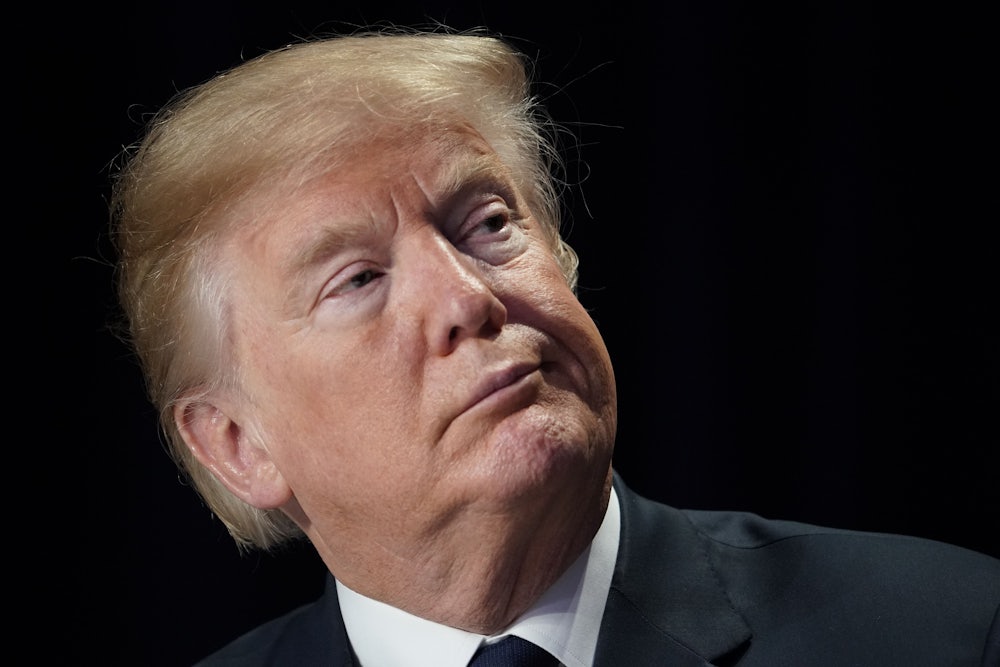President Donald Trump has refused to release a Democratic rebuttal of a discredited Republican memo that alleges surveillance abuses in the Russia investigation. “Although the President is inclined to declassify the February 5th Memorandum, because the Memorandum contains numerous properly classified and especially sensitive passages, he is unable to do so at this time,” White House Counsel Don McGahn wrote in a letter to Congressman Devin Nunes, the chair of the House Intelligence Committee. McGahn added that the administration “stands ready to review” a revised draft of the memo.
There’s good reason to doubt the White House’s concerns. Last week, the Justice Department asked Trump not to approve the release of the Republicans’ memo (known as the Nunes memo). In a rare statement, the FBI said it had “grave concerns about material omissions of fact that fundamentally impact the memo’s accuracy.” But the president shrugged off that advice, apparently more interested in the Nunes memo’s political gain.
Trump suggested on Saturday morning that his concerns weren’t limited to the potential impact on national security, describing the memo as “very political,” a phrase he did not use for the Nunes memo after it was pushed out of the House Intelligence Committee on a party-line vote. He cast the Democrats memo as a trap of sorts:
The Democrats sent a very political and long response memo which they knew, because of sources and methods (and more), would have to be heavily redacted, whereupon they would blame the White House for lack of transparency. Told them to re-do and send back in proper form!
— Donald J. Trump (@realDonaldTrump) February 10, 2018
Unlike the Nunes memo, the GOP-led House Intelligence Committee voted to release the Democratic memo unanimously. House Speaker Paul Ryan also backed the memo’s release, provided that it didn’t reveal any intelligence sources or methods. If the Democratic memo is a trap, members of his own party helped set it.
Since the White House ignored the Justice Department’s concerns about the Nunes memo, it’s hard to take Trump’s refusal to release the Democratic memo as a principled stand in defense of government secrets. On the other hand, McGahn also included a letter from Deputy Attorney General Rod Rosenstein and FBI Director Chris Wray that identified key portions for the committee’s review. Both men raised concerns about the Nunes memo, but that flawed document didn’t appear to contain any classified information that could damage national security.
Representative Adam Schiff, the House Intelligence Committee’s Democratic ranking member, said in a statement Friday night that he hopes the matter can be quickly resolved. “We will be reviewing the recommended redactions from DOJ and FBI, which these agencies shared with the White House, and look forward to conferring with the agencies to determine how we can properly inform the American people about the misleading attack on law enforcement by the GOP and address any concerns over sources and methods,” he said.
After ignoring urging of FBI & DOJ not to release misleading Nunes memo because it omits material facts, @POTUS now expresses concerns over sharing precisely those facts with public and seeks to send it back to the same Majority that produced the flawed Nunes memo to begin with: pic.twitter.com/qNVyS99eXs
— Adam Schiff (@RepAdamSchiff) February 10, 2018
What that means for the memo’s ultimate fate is unclear. It’s possible the redactions could remove key details that Democrats say will refute the Nunes memo’s allegations, thereby nullifying its purpose. It’s possible Democrats could instead seek to release it without the White House’s support by using the arcane process outlined by Subsection 11(g) of House Rule X. But it’s unclear if the Republican House majority would back such a move, or whether the Democrats would face their own political blowback for seemingly disregarding the Justice Department’s advice.
The Democratic memo likely shows what’s already known: This debate is a sham. Republicans on the House Intelligence Committee used their vital oversight powers to launch a partisan attack on the Russia investigation. That gambit failed, but its corrosive impact on the committee’s credibility, and on congressional oversight of the intelligence community, appears to be very real. Unnecessary damage to American institutions may be this whole affair’s most lasting impact.
